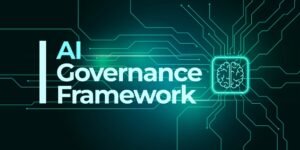In the rapidly evolving landscape of technology, Artificial Intelligence (AI) has emerged as a frontier with boundless potential and equally significant risks. As we integrate AI deeper into the fabric of business and society, the importance of effective Artificial Intelligence Governance cannot be overstated. IT consultants, positioned at the crossroads of technology implementation and strategic business planning, play a pivotal role in shaping the future of AI governance. This blog post aims to provide a comprehensive roadmap for IT consultants to navigate the complex terrain of AI governance, ensuring ethical, secure, and efficient use of AI technologies.
Understanding Artificial Intelligence Governance
Before diving into the roadmap, it’s essential to grasp what Artificial Intelligence Governance entails. AI Governance is a framework for managing AI development and use, ensuring that AI technologies are ethical, transparent, accountable, and aligned with human values and societal norms. It encompasses policies, principles, and practices that guide the ethical development, deployment, and maintenance of AI systems.
The Significance of AI Governance
The significance of AI Governance lies in its potential to mitigate risks associated with AI, such as bias, privacy breaches, security vulnerabilities, and ethical dilemmas. By establishing robust governance structures, organizations can harness the benefits of AI while safeguarding against its potential harms, ensuring AI technologies serve the common good.
A Roadmap for IT Consultants
As IT consultants, navigating the complexities of AI Governance requires a strategic approach, blending technical expertise with ethical considerations. Here’s a roadmap to guide IT consultants in advising organizations on effective AI Governance:
1. Gain Deep Understanding of AI Technologies
- Stay Informed: Keep abreast of the latest developments in AI technologies, understanding their capabilities, limitations, and ethical implications.
- Technical Proficiency: Develop a deep technical understanding of AI systems, including machine learning, natural language processing, and neural networks.
2. Foster Ethical AI Development
- Ethical Frameworks: Advocate for the adoption of ethical frameworks in AI development, emphasizing fairness, accountability, transparency, and privacy.
- Bias Mitigation: Implement strategies to identify and mitigate biases in AI systems, ensuring equitable outcomes for all users.
3. Implement Robust AI Governance Policies
- Policy Development: Assist organizations in developing comprehensive AI governance policies, covering data management, model training, deployment, and monitoring.
- Regulatory Compliance: Ensure AI systems comply with existing and emerging regulations related to data privacy, security, and ethical use.
4. Promote Transparency and Accountability
- Transparent AI Systems: Encourage the development of AI systems that are transparent in their decision-making processes, enabling users to understand and trust AI outputs.
- Accountability Mechanisms: Establish mechanisms for accountability in AI systems, ensuring responsible parties can be held accountable for AI outcomes.
5. Engage in Continuous Learning and Improvement
- Continuous Monitoring: Advocate for continuous monitoring of AI systems, identifying and addressing issues as they arise.
- Feedback Loops: Implement feedback loops, allowing for the ongoing refinement of AI systems based on user experiences and societal impacts.
6. Champion AI Literacy and Public Engagement
- AI Literacy: Promote AI literacy within organizations and among the general public, ensuring individuals understand the benefits and risks associated with AI.
- Public Engagement: Encourage public engagement and dialogue on AI governance, fostering a collective approach to ethical AI development and use.
Conclusion
Artificial Intelligence Governance is not merely a regulatory checklist but a strategic imperative for harnessing the transformative power of AI responsibly. IT consultants, with their unique blend of technical expertise and strategic insight, are ideally positioned to lead the charge in establishing effective AI governance frameworks. By following the roadmap outlined above, IT consultants can guide organizations in navigating the complexities of AI governance, ensuring AI technologies are developed and deployed ethically, securely, and for the benefit of all.
In the age of AI, the role of IT consultants in shaping the future of Artificial Intelligence Governance has never been more critical. By championing ethical AI development, robust governance policies, and continuous improvement, IT consultants can help steer the course of AI towards a future that is not only technologically advanced but also ethically sound and socially responsible.

